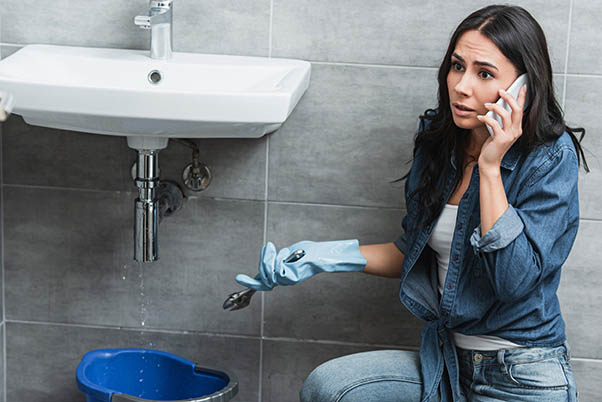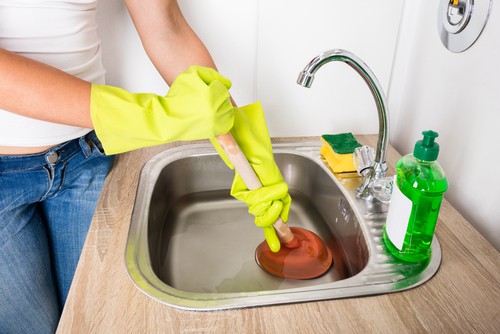Effective Solutions for Pipe Issues: Key Steps to Take Until Help Arrives
Effective Solutions for Pipe Issues: Key Steps to Take Until Help Arrives
Blog Article
Here underneath you can get a good deal of high-quality insight with regards to Plumbing Emergencies: Tips on What To Do Before.

Plumbing emergency situations can strike any time, triggering stress and possible damage to your home. Whether it's a burst pipeline, a blocked drain, or a leaking faucet, recognizing exactly how to manage the scenario up until a professional plumbing technician arrives can conserve you from additional complications. This post provides necessary emergency pipes suggestions to aid you alleviate damages and regain control throughout a plumbing dilemma.
Switch off the Supply Of Water
The first step in any type of pipes emergency is to shut down the supply of water. For local issues, such as a dripping faucet or bathroom, turn off the valve near the component. In the case of a significant leak or ruptured pipeline, situate your home's main water shut-off shutoff and transform it off instantly. Understanding the area of these valves in advance can conserve important time throughout an emergency.
Turn off Your Hot Water Heater
In certain emergency situations, such as a ruptured pipe, it's smart to shut down your water heater. This stops getting too hot or damage to the device when water quits flowing. Shut off the power supply to the hot water heater (electric or gas) and let it cool off to stay clear of potential risks.
Momentarily Quit a Burst Pipe
A ruptured pipeline can lead to significant water damage in mins. To minimize the concern:
Call a professional plumber instantly to address the trouble completely.
Have an Emergency Situation Plumbing Kit
Prepare a basic pipes emergency situation package to take care of small problems efficiently. Your kit should include:
Having these devices handy can make a substantial difference in your capability to handle emergencies.
Unclog Drains Pipes Securely.
A clogged up drainpipe can be an irritating and unpleasant concern. Right here's exactly how to tackle it:.
If these approaches do not work, avoid using extreme pressure, as it may get worse the blockage.
Handle Overflowing Toilets.
An overflowing commode can cause prompt mayhem. Here's what you must do:.
Address Tiny Leakages with Temporary Repairs.
Tiny leaks can rapidly come to be significant issues if left uncontrolled. Use these momentary fixes until expert aid arrives:.
While these repairs aren't irreversible, they can aid decrease water loss and damages.
Handle Frozen Pipes Carefully.
In colder climates, frozen pipes are a common emergency. If you presume an icy pipeline:.
Know When to Call a Professional.
While quick fixes can help momentarily, particular pipes concerns call for prompt specialist focus. Call a plumbing professional if:.
Promptly speaking to an expert makes sure the problem is dealt with correctly and prevents further difficulties.
Stop Additional Damage.
Taking fast activity to lessen damage can save you money and time in the future. Right here's how:.
Verdict.
Plumbing emergency situations can be frustrating, but with the appropriate expertise and devices, you can manage the circumstance effectively till assistance gets here. By shutting off the supply of water, resolving little leaks, and making use of short-term solutions, you can lessen damage and maintain your home safe. Remember, these ideas are short-term remedies; always get in touch with an accredited plumbing professional to take care of the root cause of the problem. Prep work and quick reasoning are your ideal allies in any pipes emergency situation.
8 Helpful Tips for Managing Plumbing Emergencies at Home
If your plumbing system hasn’t failed once, wait for it because almost everyone has a story to tell. Sometimes, it could be simple emergencies such as a leaking pipe, a blocked cistern, or even a big burst pipe. In situations like this, you need to have some handy tips to save you some money and from possible damages.
Take care of minor issues early.
Sometimes, you could have avoided an emergency by taking proactive measures while it was still early. Some major plumbing emergencies can be a result of an ignored minor issue. We recommend that you have items like plumbing tapes and other related items. A plumbing tape can allow you to manage minor leaks before the plumber arrives.
Cut off the water supply.
This tip is essential in almost any type of leakage problem. For problems like minor leakages in the toilet or kitchen, turn off the supply that takes water to the affected pipes. If the leakage is a major pipe, you must shut off the supply valve to the entire building. This will help you avoid flooding your home and neighbors if you share a flat.
Know your plumbing system
Folks typically move into a new apartment without understanding the water supply around the building. This can prove disastrous if a water emergency arises and the plumber is far away. The previous tip will prove useless if you don’t practice this one. More importantly, know where your water shut-off valve is located – you’ll need that knowledge to prevent potential home floods.
Have some common handy tools
There are lots of plumbing emergencies that you can handle without hiring a plumber. That’s why you must keep some tools available always. Some tools that you can use to fix simple plumbing emergencies easily include plumbing tapes, screwdrivers, thread seal tapes, plungers, pliers, tape measures, and rubber gloves.
Insulate your pipes from cold
You’ll save yourself from many plumbing expenses if you protect your water pipes from the cold. This is because of the harmful effects that cold weather can have on your pipes. During winter, your pipes can burst from being overly expected to freezing temperatures. So, make sure insulators are there to keep the pipes working correctly.
Avoid practices that will clog your toilet.
Many people indulge in practices that can damage the plumbing system of the entire building. One of these is when they use their toilet to dispose-off garbage. They flush all kinds of things, such as paper towels, bandages, hairs, female sanitary products, etc., down the toilet. This will block your toilet in the long run, incurring unnecessary expenditures. Dump such waste in the trash instead.
Check your dials regularly.
Sometimes, there could be leakages in your home without noticing them in time. So, constantly monitor your water meter dial. If the dial is reading when there is nobody using water, this is an indicator that there is leaking. Check for leaks immediately. Call a plumber as soon as possible if you can’t find any.
https://www.constructionplacements.com/8-helpful-tips-for-managing-plumbing-emergencies-at-home/

As an avid person who reads on Expert Tips for Managing a Plumbing Emergency Until Help Arrives, I imagined sharing that portion was a great idea. Sharing is good. You won't know, you may be doing someone a favor. Thanks for being here. Please come visit our blog back soon.
Click Here Report this page